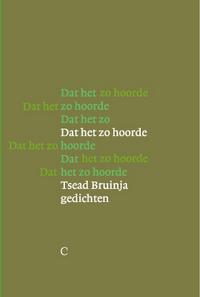Artikel
Tsead Bruinja & the new generation of Frisian poets

23 februari 2016
In addition to being a poet, Bruinja is also active as an anthologist: October 2004 witnessed the presentation of a bilingual miscellany that he compiled in conjunction with Hein Jaap Hilarides: Droom in blauwe regenjas/ Dream yn blauwe reinjas – Nieuwe Friese dichters / Nije Fryske dichters (Dream in a blue raincoat – New Frisian poets). At the beginning of 2005, the collection of poems Klotegedichten (Balls) appeared, edited by Bruinja and Daniël Dee. This is a sequel to the anthology Kutgedichten (Twat) which appeared in 2004.
Tsead Bruinja currently lives in Amsterdam. He studied English and Frisian at the University of Groningen. The central theme in his Frisian oeuvre is the struggle with his mother tongue. He is seeking his roots and involves the reader in this quest: “De holle is my net genôch. Ik bin wer thús oan it kommen yn myn lea. Ik wol graach datst meisjochst” (“The mind alone is not enough for me. I am returning home to my body. I want you to come and see”), he writes in the epilogue to Wizers yn it read. Of course, his quest is not without problems. Bruinja attempts to form the words to his image, but that fails. The language “bliuwt fan wetter/ it oantinken en ik stik/ sawat yn ’e gloarweagen/ de wurden dy’t it swimbad/ my yn de mûle triuwt/ gean mei my kopke-ûnder” (“remains water/ memories and I almost drown/ in the chlorinated waves/ the words that the swimming pool/ crams into my mouth/ join me in ducking under), as expressed in Gegrommel fan satyn.
The musicality and the wealth of association make it a pleasure to read Bruinja’s work, but it is just as pleasant to listen to it and to watch him present it. His performances, either with or without music accompaniment by hip-hop of flamenco musicians, fire the imagination.
“remember there is a land that is part of me where I do not live/ I must return there is a mystery I must engage in// who do I scare where who do I deprive of night/ I make another world with light and proudly present my peep-show”. These lines come from Batterij (Battery), published in 2004, the second Dutch-language collection of poetry by the Frisian poet Tsead Bruinja (Rinsumageest, 1974). Prior to this, he had already privately published two Dutch-language collections: Vreemdgaan (Straying) in 1998, and Startschot (Starting shot), with a number of other poets, in 1999. In 2003, he published the collection Dat het zo hoorde (The way it should sound).
Tsead Bruinja belongs to a new generation of Frisian poets. Just like many other young Frisians, Bruinja writes in both Dutch and Frisian, mirroring the bilingual situation in Friesland. In 2000, he made his debut in Friesland with the collection of poems De wizers yn it read/ De wijzers in het rood (The meter in the red). A year later his De man dy’t rinne moat/ De man die lopen moet (The man who has to walk) appeared, and the third Frisian collection Gegrommel fan satyn/ Gegrommel van satijn (Snarls of satin) was published in 2003.In addition to being a poet, Bruinja is also active as an anthologist: October 2004 witnessed the presentation of a bilingual miscellany that he compiled in conjunction with Hein Jaap Hilarides: Droom in blauwe regenjas/ Dream yn blauwe reinjas – Nieuwe Friese dichters / Nije Fryske dichters (Dream in a blue raincoat – New Frisian poets). At the beginning of 2005, the collection of poems Klotegedichten (Balls) appeared, edited by Bruinja and Daniël Dee. This is a sequel to the anthology Kutgedichten (Twat) which appeared in 2004.
Tsead Bruinja currently lives in Amsterdam. He studied English and Frisian at the University of Groningen. The central theme in his Frisian oeuvre is the struggle with his mother tongue. He is seeking his roots and involves the reader in this quest: “De holle is my net genôch. Ik bin wer thús oan it kommen yn myn lea. Ik wol graach datst meisjochst” (“The mind alone is not enough for me. I am returning home to my body. I want you to come and see”), he writes in the epilogue to Wizers yn it read. Of course, his quest is not without problems. Bruinja attempts to form the words to his image, but that fails. The language “bliuwt fan wetter/ it oantinken en ik stik/ sawat yn ’e gloarweagen/ de wurden dy’t it swimbad/ my yn de mûle triuwt/ gean mei my kopke-ûnder” (“remains water/ memories and I almost drown/ in the chlorinated waves/ the words that the swimming pool/ crams into my mouth/ join me in ducking under), as expressed in Gegrommel fan satyn.
The musicality and the wealth of association make it a pleasure to read Bruinja’s work, but it is just as pleasant to listen to it and to watch him present it. His performances, either with or without music accompaniment by hip-hop of flamenco musicians, fire the imagination.
© Babs Gezelle Meerburg
Vertaler: George Hall
Sponsors















